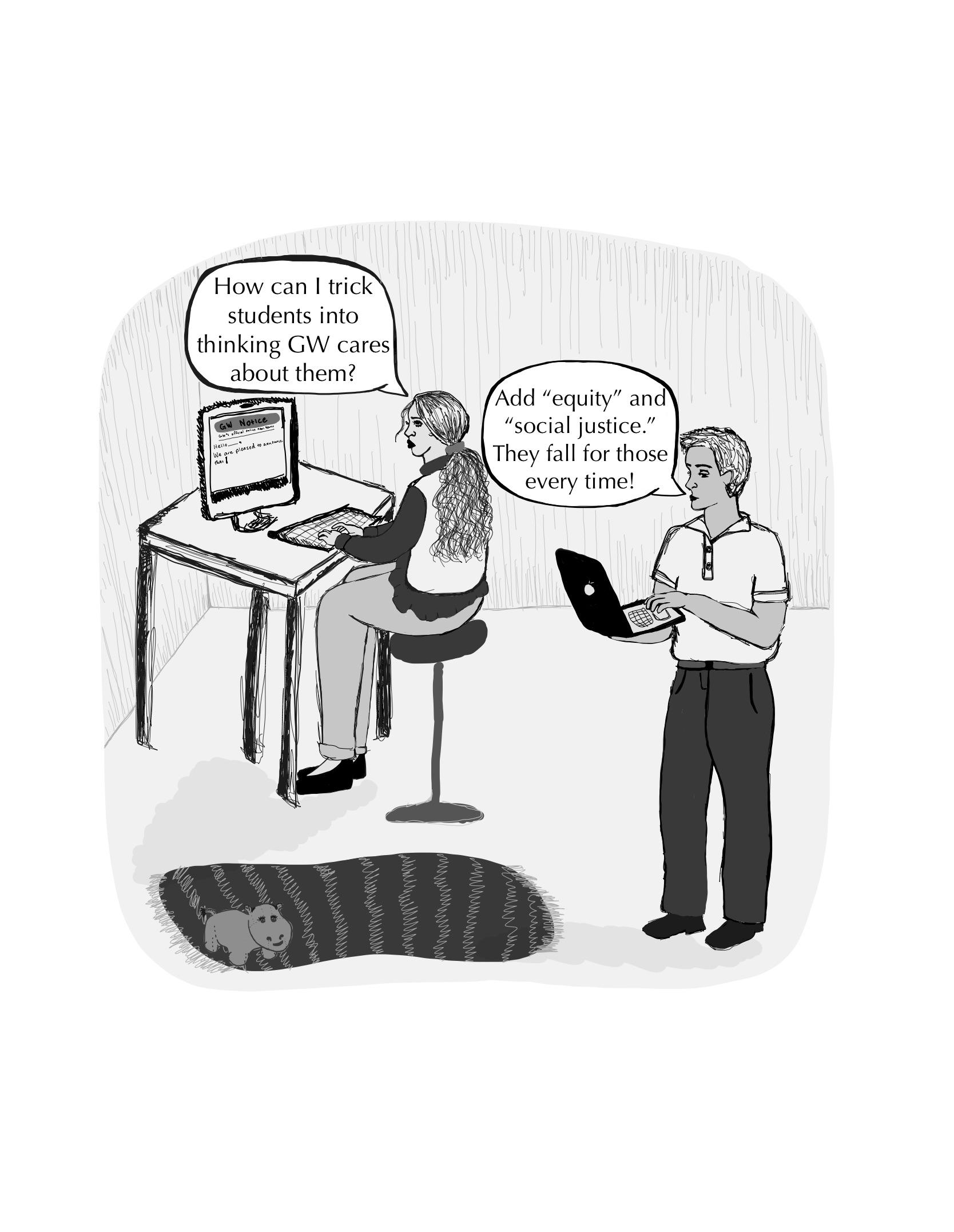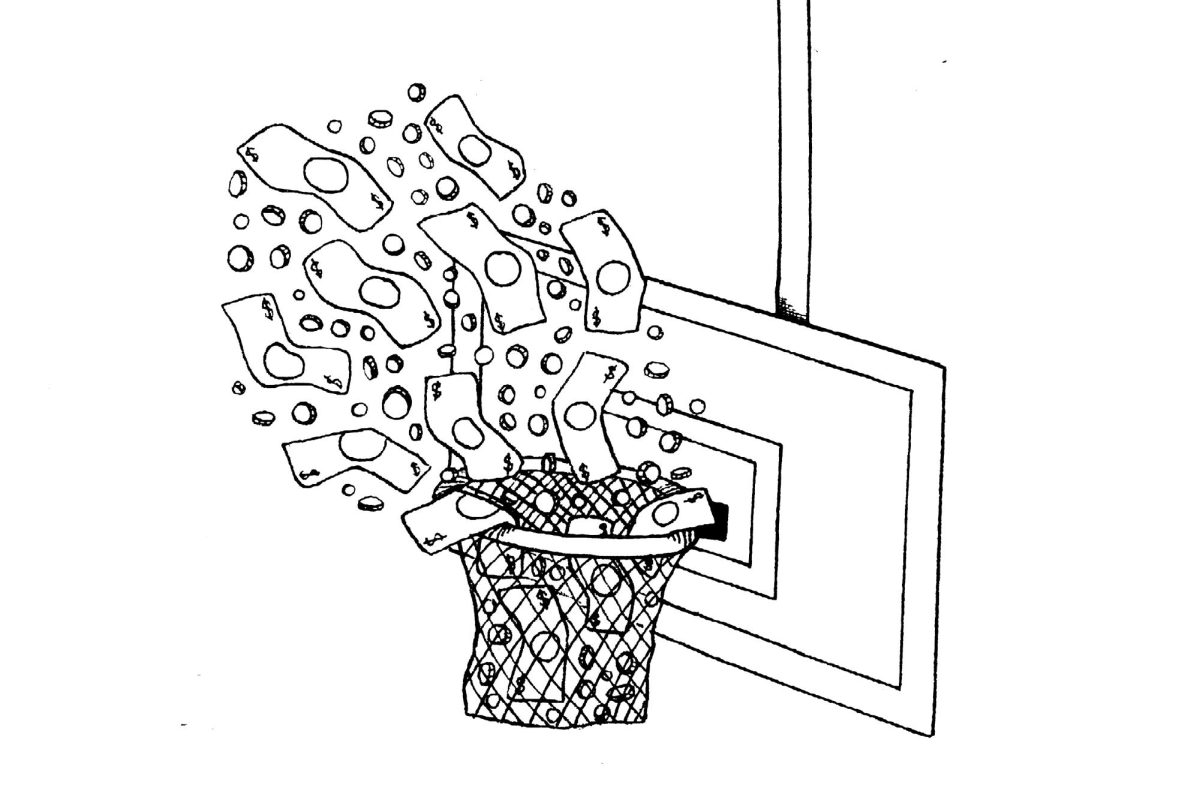With the search for the University’s next president well underway, long-term strategic planning at GW is in limbo. The pandemic rendered former University President Thomas LeBlanc’s already-unpopular strategic plan obsolete, and because of his limited interim role, University President Mark Wrighton is overseeing the transition to GW’s next president without a strategic plan of his own. And now, with the goal to set GW on a path to global renown, the Board of Trustees and academic deans have weighed in on their own vision for the near future with a series of academic priorities for GW, including equity and social justice, sustainability and climate change, data science and academic medicine.
But there’s an easier, more tangible way of improving the University’s prestige before setting sail for a lofty future – focus on the fundamentals of the academic experience first so students have the basic support they need to succeed. Between a lack of classroom accommodations, deadnaming students in official communications and yet another member of the faculty who defended his use of the N-word, the University is failing its students in the most glaring ways. GW can’t become a leader in higher education solely with ambitious academic priorities when students don’t even feel welcome in its classrooms – it needs to go back to the basics and treat students with decency and respect.
These academic priorities come at a time when GW’s long-term strategic planning is still in flux. LeBlanc’s 20/30 plan, which focused on cutting undergraduate enrollment and refocusing academics around STEM education, floundered amid the pandemic and outcry from faculty. And instead of leaving his own mark on GW, Wrighton acts more as a caretaker than an innovator, focusing on repairing the relationships between students, faculty and officials that LeBlanc’s leadership damaged.
So in the absence of a strategic plan, complete with corresponding policies and programs, the deans’ and Board of Trustees’ academic priorities offer the University some form of guidance for the future. Instead of a singular plan spearheaded by GW’s president, the University’s areas of focus are all meant to attract “world-class” faculty and “enhance GW’s global reputation,” Provost Chris Bracey said at a Faculty Senate meeting earlier this month.

Jenna Baer | Cartoonist
A more equitable and sustainable GW would undoubtedly be a better university, and more funding and administrative attention for data science and medical programs will surely catch the eye of top-notch students, researchers and professionals. But that vision assumes these academic priorities actually come to fruition. These priorities read more like a wish list than an actionable to-do list, never mind the fact that GW’s next president could outline a different strategic plan entirely, like investing in the humanities or focusing on career training.
If officials are really committed to equity and social justice, they can act right now. For one, stop deadnaming students in University communications. To their credit, the Office for Diversity, Equity and Community Engagement and GW Information Technology emailed students last Friday with guidance about changing their name in a variety of University systems. But now, they need to ensure that these processes actually work.
That sense of respect should carry into the classroom as pandemic-era accommodations like more lenient deadlines and remote classes recede. Last October, the Post-COVID Academic Innovation Task Force released findings that students supported recorded lectures and virtual office hours and professors wanted the option to teach remotely, in person or in a hybrid format with the training and equipment to do so. But outside of Disability Support Services, the accommodations students receive largely vary from professor to professor.
And while this semester is already well underway, requiring faculty to publish their syllabi to Blackboard in advance of the first day of class and offer free, unexcused absences for personal or mental health reasons would make it both easier and less stressful to participate in classes. Students could plan out their assignments well ahead of time instead of scrambling to read the syllabus minutes before their first class. A more lenient policy toward unexcused absences would also give students the opportunity to momentarily put aside their academic responsibilities to focus on their well-being.
When we say GW needs to get back to basics, we’re really asking for officials and faculty to do the bare minimum – use our names, accommodate our needs. The news that a professor defended his use of the N-word in front of his entire class earlier this month exemplifies officials’ failure to do so. When a professor so brazenly and recklessly defends their use of a racial slur to their students, it’s evident that previous lessons on creating an inclusive educational environment haven’t stuck with all faculty members. Although the professor is no longer instructing this class, allowing him to continue to teach at GW this fall confirms that the University’s training and disciplinary efforts aren’t working. GW must fire this professor – cycling a racist member of faculty between different courses is no way to create an academic experience that welcomes every student.
The measures we propose aren’t as glitzy or glamorous as brand new initiatives, but they will have a much greater and much more immediate impact than a series of academic priorities that never come to fruition. There may not be an awards ceremony nor ribbon cutting when a student receives a routine email that uses their name, watches a recording of class or sees a syllabus appear on Blackboard, but it will mean a great deal when students can take those expectations for granted.
Focus on the minute, tangible tactics that can quickly improve students’ academic experience, and leave the grand planning for Wrighton’s successor. If officials want GW in the spotlight, they’ll have to get back to basics and make their classrooms safe, supportive spaces first.
The editorial board consists of Hatchet staff members and operates separately from the newsroom. This week’s staff editorial was written by Opinions Editor Ethan Benn and Contributing Opinions Editor Riley Goodfellow, based on discussions with Research Assistant Zachary Bestwick, Sports Editor Nuria Diaz, Copy Editor Jaden DiMauro, Culture Editor Clara Duhon and Contributing Social Media Director Ethan Valliath.


